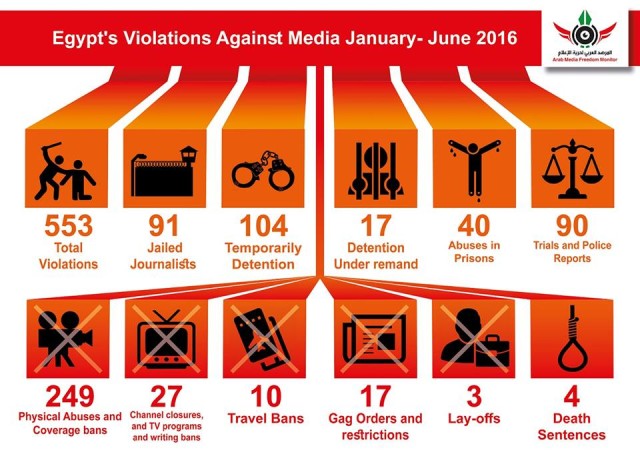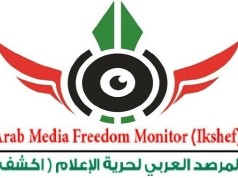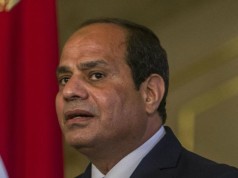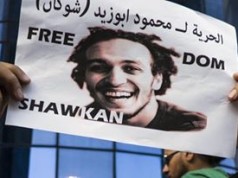
553 Violations, most notably sentencing 4 journalists to death, storming EJS and trying its head.
91 journalists still jailed .. 104 temporarily detentions
40 abuses against jailed journalists .. 10 travel bans
249 physical abuses and coverage bans .. 17 restrictions and gag orders
London – 20 July 2016
First half of 2016 has witnessed a variety of violations that take place for the first time in the history of Egyptian press. Among which are sentencing 4 journalists to death in one case, storming Egyptian Journalists Syndicate “EJS” and trying its head.
The same period witnessed also unprecedented numbers of violations that its 553 violations. They include imprisonment, detentions on remand, abuses in prisons, police complaints, trials, physical abuses, coverage bans, banning of TV channels and programs, article bans, travel bans, gag orders, restrictions and firing of journalists.
Detentions on remand are 17, abuses in prisons 40, police complaints and trials 190, physical abuses and coverage bans made a record number of 249, banning of TV channels, programs and article 27, travel bans 10, gag orders and restrictions 17 and firing of journalists are 3 cases.
Report Summary
First: Imprisonment and detentions on remand (104 cases):
First half of 2016 has witnessed 104 temporarily detentions, 10 of which continued and added to the list of ongoing confinement, which rose to 91 journalists. Also, 7 journalists and photographers have been released after being jailed for long periods, whether by decisions of the imprisonment of reserves or by court orders.
First quarter of 2016 witnessed the imprisonment or detention of 12 journalists and photographers; 8 of them were released and the others remained locked up.
Journalists who have been imprisoned or detained for long or temporary periods during the first three months of 2016 are Mahmoud Al-Sakka of Yanayir portal (detained on January 1st and was released on March 5th); Ahmed Abdel Gawad, managing director of Masralarabia.com (detained January 12 and was released two days after); photographer Ahmed Yusuf (detained on January 16 and was released one day later); Ammar Abdul-Majid (detained on January 25 and still in jail); cartoonist Islam Jawish (detained January 31 and was released two days after); Moaz Mostafa Al-Qenawi of Al-Hadath website (detained on February 10 and still in prison); Sabri Anwar a reporter of Al-Badil newspaper (detained on February 18 and still in prison); Ahmed Nagy of Akhbar Al-Youm (detained on February 20 and still in prison); and three journalists of Al-Omah website Ahmed Nasruddin, Islam Atif and Alaa Khamis, beside Assem Abdul-Fattah, the managing director of the website on March 15 and all of them were released two days later.
The other three months have seen a large number of imprisonments and confinements. April witnessed the largest number of which, confinements and detentions amounted to 84 cases, including 46 cases on April 25, while April 15 of the same month witnessed 13 cases – the two days are related to protests over handing control of two islands to Saudi Arabia; in addition to the other cases, which were distributed to the rest of the month, all detainees were released except journalist Abdul-Rahman Ali of Al-Aqsa channel, and Ali Abdeen of Alfajr newspaper who was released later.
In addition to jailed Mohammed Al-Saeed Al-Dashti is a correspondent of Al-Mashhad newspaper in Damietta, on whom information about his imprisonment was emerged during the April, although he was jailed before that.
In May, journalists Amr Badr and Mahmoud Al-Sakka of Yanair portal were detained early in that month during the famous incident of storming EJS, in addition to uncovering of another case concerning journalist Sami Al-Madani who was detained in April 2016, in addition to sentencing journalist Ali Abdeen on May 14 for 3 years in prison who was released later.
On May 30, EJS head Yahya Qalash, his deputy Khaled Al-Balshi head of freedoms committee, and EJS secretary general Jamal Abdul-Rahim, were held on the backdrop of being accused of harboring wanted journalists. The three were denied release until paying bails. They were released later after bails bayed by unknown people.
In June, journalist Ahmed Hamouda Al-Sakhawi who works for Misr newspaper was arrested; freelance journalist Rami Mohammed in the eastern province of Suez appeared after disappearing for ten days, despite a verdict to be released, however, he is still held. Moreover, Ali Ahmed Fouad, correspondent of Karmoz.com website in Alexandria, was sentenced to three years in prison. Also, TV hosts Mohamed Nasser of Mekameleen TV station and Moataz Matar of Elsharq TV station were sentenced in absentia to two years in imprison.
Concerning releasing and aquital of journalists, Some previously detained journalists were released. They are Hossam Al-Sayed of Masralrabia.com website, who was previously arrested and detained since October 22, 2015; photojournalist Aliaa Awad of Rassd network, she was jailed by a judicial ruling since February 2015; journalist Abu Bakar Khallaf head of Electronic Media Syndicate “EMS” released on bail, accused of spreading false information (He was sentenced later to 3 years in prison, however, he had already left Egypt); journalist Mahmoud Al-Sakka of Yanair portal was also released, but detained later; photojournalist Abdul Rahman Taher of Masrawy website released on bail after his imprisonment of reserve for one year, he paid 10-thousand-pound-bail (about 1200 $) for a charge of demonstrating; Abdul Rahman Abu Ouf of Albawabhnews.com after 3 months in jail; and filmmaker Mohammad Hejazi was released after accepting his appeal on a 10-year sentence after spending two and a half years in jail.
April also witnessed the release of journalist Mohamed Al-Yamani of Al-Hurriya wa Al-Adala newspaper after spending more than two years on remand. June witnessed photojournalist Ali Abdeen of Alfajr newspaper was acquitted and released in the case of April 25 protests.
Second: Abuses in prisons (40 cases):
Prisons and places of detention have witnessed numerous violations of journalists and media prisoners and their families amounted to 40 violations, among them there were 6 cases in February, 11 in March, 8 in April, 7 in May and 8 cases in June. It was not possible monitoring such violations in last January.
These violations included torture and abuse against detainees who faced electrocution, physical and verbal assault, solitary confinement, imprisonment with criminals, and visit bans or humiliating those who were allowed to visit the detainees.
Violations included lack of medical examinations, blocking access to medicines and delay in delivering them and in therapy procedures. All of these are in violation of Egyptian prisons’ regulations and all global human rights conventions signed by Egypt, which provide protection for prisoners during the period of imprisonment of reserves or by court orders.
Third: Police complaints and trials (190 cases):
The first half of the year have witnessed 190 cases of police complaints and trials, which amounted to 14 in January, 26 in February, 39 in March, 34 in April, 40 in May and 37 in June.
The most famous and important of these trials are death sentences against 4 journalists in May, and ruling confirmation in June, in addition to the prosecution of EJS head Yahya Qalash, EJS general secretary Gamal Abdul-Rahim and Khaled Al-Balshi, Qalash deputy and head of freedoms committee.
Fourth: Physical abuses and coverage bans (249 cases):
Total cases physical abuses and prevention of coverage amounted to 249 cases. They took place as follow; January 46, February 46, March 44, April 42, May 40 and 31 cases in June. Courts have witnessed most coverage bans during the first half of the year, followed by government agencies, clubs and Parliament.
Attacks have varied on journalists, particularly field correspondents and photographers during the first half of the year. This period has witnessed many coverage bans, whether individually or collectively. Gag orders were issued by Attorney General Nabil Sadeq, parliament speaker Dr. Ali Abdul-Aal and a number of ministers, which is contrary to rules of transparency and the free flow of information protected by the Egyptian Constitution. In this part we may focus more on cases of attacks and prevention of collective coverage and limit ourselves to examples, because details of individual and collective cases were mentioned in separate monthly reports, which we published before.
Fifth: Banning of TV channels, programs and article (27 cases):
The first half of the year witnessed several major cases of banning from writing or appearing on TV, or stopping programs or even channels either continuously or temporarily. They amounted to 27 cases, including 5 in January, 2 in February, 3 in March, 9 in April, 4 in May 4 and 4 in June.
These cases included prominent figures such as Mamdouh Al-Wali, former EJS head who received an EJS’ decision preventing him from practicing journalism for two months under the pretext of violating an EJS earlier decision not to participate in the writing of the Constitution in 2012. The cases include also preventing TV host Azza Al-Hinnawi from appearing on state television because her criticism for president Abdul-Fattah Al-Sisi; temporarily stopping broadcasts of Mekameleen and Dream TV channels; Stopping “Momken” (possible) program of TV host Khairy Ramadan for two weeks by a decision of the Chamber of the Media Industry because of an interview that tackled women in Upper Egypt badly; politically motivated closure of Elfaraeen TV channel and prevention of publication of articles by the poet Sayed Hijab, writers Nawal Al-Saadawi and Ammar Ali Hassan, Ahmed Al-Najjar, head of board of Al-Ahram and others.
Sixth: Travel bans (10 cases):
The first half of 2016 has witnessed many travel bans and arrests in airports. During January and February there were 5 cases travel bans or arrests. They were Abu Bakar Khallaf head of EMS, Hossam Bahgat, poet and writer Omar Hazeq, human rights activist specialized in freedom of information and expression Gamal Eid and journalist Walid Al-Sheikh.
March has not witnessed any travel bans.
April has seen one case. May has witnessed 4 cases of Tv host Tawfiq Okasha, a French journalist denied entry, and names of TV hosts and artists Hisham Abdullah and Mohammad Shoman were entered in arrival anticipation lists.
On January 14 security forces prevented the poet Omar Hazeq from traveling to the Netherlands to receive the freedom of expression Award of Writers Without Borders foundation, a prize he won after his release from prison, winning a presidential pardon in 23 September 2015.
Journalist Walid Al-Sheikh of German DW channel was arrested at Cairo airport and detained for several hours before being released
On the third of February, Cairo airport authorities prevented human rights activist Gamal Eid, head of Arabic Network for Human Rights Information, which defends freedom of information and expression, of travel and returned him with his luggage.
On February 15, Cairo airport security authorities prevented Abu Bakr Khallaf head of EMS from leaving the country on an Oman Airlines flight to Muscat, as he was detained for several hours and his luggage was brought from the plane, and then released later.
On February 23, Cairo airport authorities barred journalist and human rights activist Hossam Bahgat from traveling while leaving for the Kingdom of Jordan, aboard an Egypt Air flight, implementing a decision by the Attorney General
The other three months have witnessed 5 cases; one case in April, 4 cases in May, June hasn’t witnessed any cases.
In the month of April there was one case where security forces at Cairo airport on April 3 arrested journalist Engy Salama, for two hours while returning to Berlin despite her two sons Ahmed and Ali (aged 12 and 11) were with her, and conducted an illegal investigation with her, then let them travel shortly before the plane took off.
In May, it was possible to register four cases of travel bans or entry bans. They included prevention of TV host Tawfiq Okasha from travelling, and prevention the French journalist Rémy Pigaglio, correspondent for the French newspaper La Croix and RTL radio station, beside names of TV hosts and artists Hisham Abdullah and Mohammad Shoman were entered in arrival anticipation lists.
Seventh: Gag orders and restrictions (17 cases):
Restrictions and prohibition of publication have amounted to 16 cases; January has witnessed 2 cases, February 3, March 3, April 1, May 3 and June 4 cases.
Beside gag orders issued by the heads of courts in pending cases in front of them and referred to in prevention of coverage section, investigative bodies issued gag orders on major cases of public concern. They are the case of financial corruption announced by the sacked head of the Central Accounting Authority, Hisham Geneina, the case of nuclear plant project and the case of foreign funding. Moreover, authorities imposed restrictions directly or indirectly on publication. This in addition to the murder case of former Attorney General and other cases.
Eighth: Sacking of journalists (3 cases):
Some newspapers and TV channels are experiencing financial crises as a result of declining revenues from advertising and distribution due to absence of real competition and less freedoms. That caused these news outlets to get rid of large numbers of workers, so dozens of journalists and media workers have found themselves surprisingly with no work nor payment.
List of 91 Detained Journalists in Egypt till 30 June 2016
- 1. Amr Badr (Editor of Yanairportal)
- 2. Mahmoud Al-Sakka (Journalit, Yanairportal)
- 3. Sami Al-Madani (Freelance journalist)
- 4. Magdi Ahmed Hussein (Editor of Al-Shaab Al-Jadeed)
- 5. Hani Salah Al-Din (Managing editor of Youm7)
- 6. Hisham Jaafar (MADA)
- 7. Ismail Al-Iskandrani (Freelance journalist)
- Yusuf Shaaban (Albedaiah.com)
- Islam Al-Beheiri (Youm7)
- Ahmed Naji (Akhbar Al-Adab)
- 11. Ahmed Sebaie (Head of Al-Aqsa TV office in Egypt)
- Hassan Al-Qabbani (Al-Karama newspaper)
- Mohammed Saber Al-Batawi (Al-Akhbar)
- Ibrahim Al-Dadrawi (Al-Qawmiya for distribution)
- Mohsen Radi (Al-Dawa)
- Said Abu Haj (Sinai Media Center)
- Amr Al-Khafif (Former director of broadcast engineering in ERTU)
- Imad Abu Zaid (Al-Ahram)
- Abdo Desuqi (Ikhwanweb)
- Mohammed Ibrahim Shukri (Al-Omma TV channel)
- Walid Shalabi (Ikhwan Online)
- Yusuf Talat (Al-Sabab TV channel)
- Mahmoud Mostafa Saad (Alnahar newspaper)
- Ammar Abdul Majid (Al-Hadath website)
- Sabri Anwar (Elbadil newspaper)
- Moaaz Mostafa Qenawy (Deputy chairman of Electronic Media Syndicate)
- Ahmed Bayoumi (Dardasha newspaper)
- Samhi Mostafa (Rassd network)
- Mohamed Salah (Journalist, Al-Shaab Al-Jadeed)
- Ibrahim Suleiman (5th TV channel – National TV)
- Omar Abdul-Maksoud (Masralarabia.com)
- Mahmoud Abu Zeid, (aka Shawkan) (Demotix photo agency)
- Bakri Abdul-Aal (Al-Raya newspaper)
- Mohammed Al-Saeed Dashti (Al-Mashhad newspaper)
- Abdul-Rahman Shahin (Al-Hurriya wa Al-Adala newspaper – Aljazeera TV channel)
- Mohammed Madani (Misr 25 TV channel)
- Musaad Al-Barbari (Director Ahrar 25 TV channel)
- Khalid Hamdi (Misr 25 TV channel)
- Hassan Khudari (Misr 25 TV channel)
- Khaled Abdul-Aziz (Misr 25 TV channel)
- Jamal Al-Aleem (Misr 25 TV channel)
- Osama Izzuddin (Misr 25 TV channel)
- Mohammad Al-Adli (Amjad TV channel)
- Hassan Ibrahim Al-Banna (Freelance photographer)
- Abdullah Al-Fakharani (Rassd network)
- Abdul Rahman Morsi (Al-Aqsa TV)
- Moataz Mostafa Sahin (Al-Hurriya wa Al-Adala newspaper)
- Mohamed Salah Sowaidan (Freelance photographer)
- Mahmoud Abdul-Nabi Awad (Rassd network)
- Ibrahim Abdul-Nabi Awad (Rassd network)
- Khalid Abdul-Rauf Sahlob (Rassd network)
- Khaled Hamza (Managing editor of IkhwanWeb)
- Sayed Musa (Amjad TV channel)
- Ahmed Ali Al-Najjar (freelance photographer)
- Karim Mostafa Al-Sayed (Al-Shabab TV channel)
- Mohammed Ezzat (Ikhwan Online)
- Abdullah Shousha (Amjad TV channel)
- Ahmed Lashin (Misr 25 TV channel)
- Imran Ashour Ahmed Mohammed (Freelance correspondent)
- Mohammed Hamdi Rusl-Allah (Freelance correspondent)
- Ahmed Abdul-Hamid Awwad (Freelance correspondent, Aljazeera)
- Ahmed Fouad Mohamed Al-Sayed (Karmoz website)
- Shadi Abdul-Hamid (Freelance correspondent, Aljazeera)
- Suhaib Mohammed (Freelance correspondent, Aljazeera)
- Khalid Mohammed Abdul-Rahman (Freelance correspondent, Aljazeera)
- Wael Alhedini (Freelance correspondent)
- Mohammed Mamoun Abu Shousha (Ahrar 25 TV channel)
- Ibrahim Talha (Stringer for satellite TV channels)
- Mahmoud Jamal Ali Othman (Stringer for satellite TV channels)
- Mohyi Qassim Mohammed Abdul-Jawwad (Stringer for satellite TV channels)
- Mohammed Mostafa Abdul-Nasser Abdul-Qadir (Stringer for satellite TV channels)
- Ahmed Muharram Abdul-Salam (Stringer for satellite TV channels)
- Abdul-Rahman Mohamed Ahmed (Stringer for satellite TV channels)
- Bilal Kamal Abdul-Aal (Stringer for satellite TV channels)
- Mohammad Abdul-Nabi Fathi Abdu (Stringer for satellite TV channels)
- Sameh Mohammed Ahmed Bakri (Stringer for satellite TV channels)
- Abdullah Jamal Moftah (Stringer for satellite TV channels)
- Ammar Samir Abdul-Ghani Ahmad (Stringer for satellite TV channels)
- Ahmed Khamis Mahmoud Kheder (Stringer for satellite TV channels)
- Bilal Abdullah Ahmad (Stringer for satellite TV channels)
- Abdul-Rahman Hassan Abdul-Hafiz (Stringer for satellite TV channels)
- Ahmed Khamis Anwar Abdul-Qawi (Stringer for satellite TV channels
- Osama Hashem Mohammed Hashem (Stringer for satellite TV channels)
- Mohamed Hossamuddin Abdul-Halim Al-Kafrawi (Stringer for satellite TV channels)
- Omar Mohamed Mabrouk Al-Sawi (Stringer for satellite TV channels)
- Ahmed Ali Ahmed Al-Najjar (Stringer for satellite TV channels)
- Mohamed Ahmed Mohamed Shehata (Stringer for satellite TV channels)
- Islam Gomaa (Misr 25 TV channel)
- Abdul-Rahman Ali (Al-Aqsa TV)
- Ahmed Hamouda Al-Sakhawi (Misr newspaper)
- Rami Mohamed Zaghloul (Freelance journalist)




